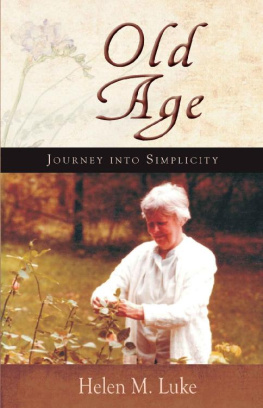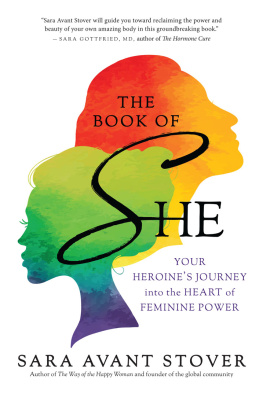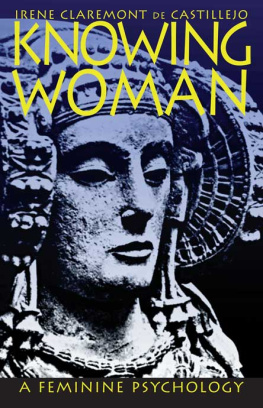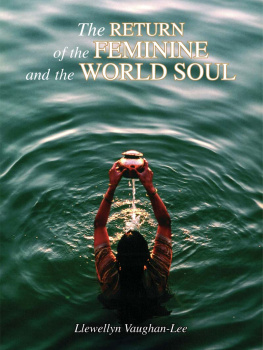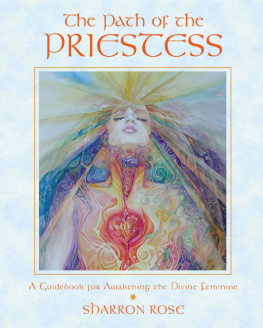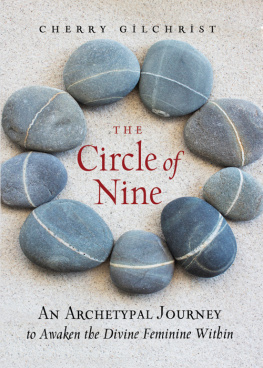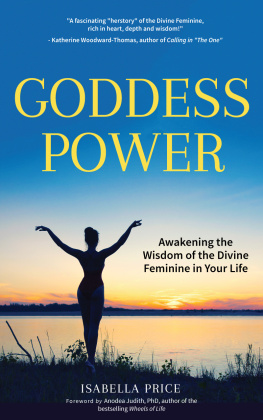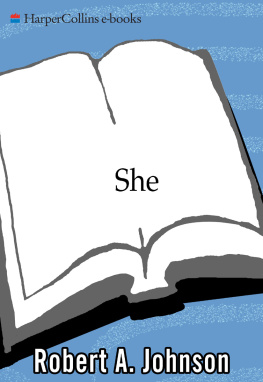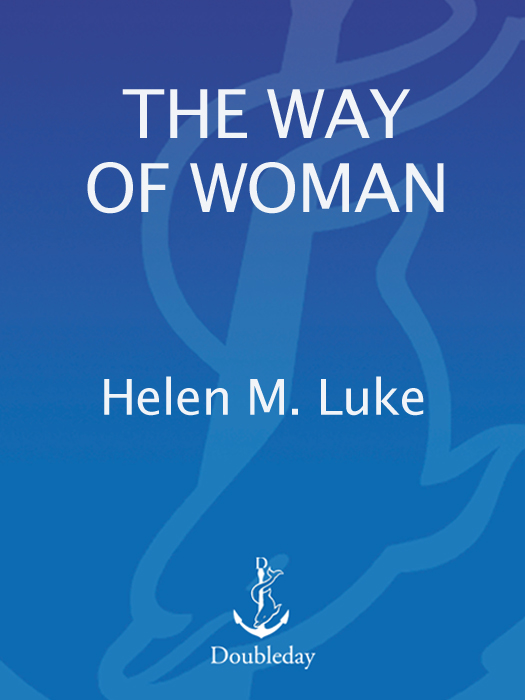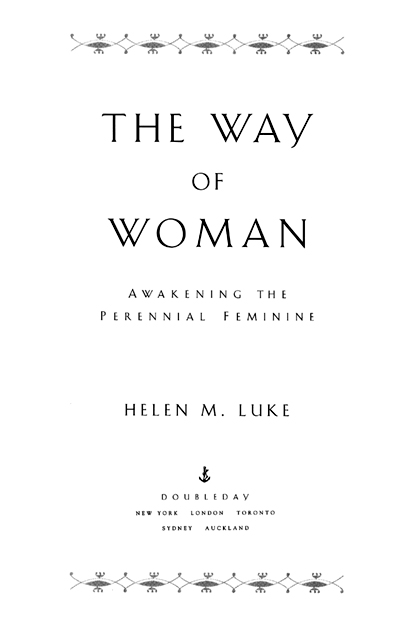ALSO BY HELEN M. LUKE
Kaleidoscope
Dark Wood to White Rose
Old Age
The Voice Within
The Inner Story
Woman: Earth and Spirit
PUBLISHED BY DOUBLEDAY
a division of Bantam Doubleday Dell Publishing Group, Inc.
1540 Broadway, New York, New York 10036
D OUBLEDAY and the portrayal of an anchor with a
dolphin are trademarks of Doubleday, a division of Bantam Doubleday
Dell Publishing Group, Inc.
The Bridge of Humility, The Perennial Feminine, The Sense of Humor, Mother and Daughter Mysteries, and Letting Go originally appeared in PARABOLA magazine. Used with permission.
A Freedom to Be Oneself originally appeared in Anima. Used with permission.
Inner Relationship and Community, Suffering, Levels, The Cat Archetype, The Inner Story, An African Tale, and The Marriage Vow originally appeared in Kaleidoscope, Parabola Books, 1992. Used with permission.
The Life of the Spirit in Women, Mother and Daughter Mysteries, Straw and Gold, and Money and the Feminine Principle of Relatedness originally appeared in Woman: Earth and Spirit, The Feminine in Symbol and Myth, copyright 1981 by Helen M. Luke. Reprinted by permission of the CROSSROAD Publishing Co., New York.
Eowyn and Orual originally appeared in an Apple Farm pamphlet entitled The Way of Woman: Ancient and Modern. Used with permission.
Charles Williams, Taliessen through Logres. London: Oxford University Press, 1954. Used with permission.
Library of Congress Cataloging-in-Publication Data
Luke, Helen M., 1904
The way of woman : awakening the perennial feminine / Helen M. Luke.
p. cm.
1. WomenReligious life. 2. Spirituality. I. Title.
BL625.7.L85 1995
291.4082dc2o 95-15929
eISBN: 978-0-307-80301-6
Copyright 1995 by the estate of Helen M. Luke
All Rights Reserved
v3.1

CONTENTS

FOREWORD
A condition of complete simplicity (Costing not less than everything)
T. S. ELIOT, LITTLE GIDDING
A lthough I never met her, Helen Luke has been a companion and guide on my journey to consciousness. Twenty years ago, as a student at the C. G. Jung Institute in Switzerland, I found myself looking for words to express some deep yearning that I could not quite fathom. Dream images were not being fully assimilated because, at the still point of knowing, they were escaping me. Then one night I came upon The Perennial Feminine. As I read, I could feel my blood pounding through my body. Yes, yes, yes, I kept saying. Yea, Helen whoever-you-are. Right on!
Leafing through this old Xerox copy which I have repeatedly pulled out of my files over the years, I laugh as I realize it is almost totally underlined with different colors of ink. As my comprehension grew, I understood at different levels, and different phrases were charged with new meaning. The gift Helen Luke gave to me was her mirroring of my feeling functionthe validation of my feminine values. Others had validated my intellectual and intuitive perceptions; others had guided my descent into my shadow. Helen Luke said to me, You are a woman. I am a woman. I know how hard it is to stand for the feminine values in a patriarchal society. Do not betray your reality. And the reality she articulated was the reality I was just beginning to live.
Reading Helen Luke is like sitting by a pool and watching a water lily unfold. Sitting in the silence, we muse on the great stem that sways as the water is kissed by the breeze. On the strength of the root that holds firm however the waters are hurled. And as we muse, one petal unfolds. And perhaps the next day another, until one day the whole blossom has unfolded to the sun. Creation opening herself to consciousness.
The power of Helen Lukes writing is in its simplicity. Only a person who has lived the tension of the opposites, who has been strong enough to hold the still point until the unity beyond the opposites becomes manifest, could articulate so clearly. Like Horowitz playing Scriabin, she has distilled the contradictions of life into its paradoxes and dances that essence in her writing.
And, like Horowitz, she can strike one note with one finger with such sensitivity that it resonates forever in our soul. Take, for example, Only the images by which we live can bring transformation (The Perennial Feminine). The statement is self-evident. Yet most of us need to remind ourselves every day that there are no microwave ovens in the royal kitchens. We cannot digest gobbled food, nor can we digest gobbled images. Both food and images that we can chew, digest, and assimilate are essential in our transformations toward wholeness. Helens prose is woven in images, both those that were natively her own from her dreams, and those she made her own from literaturethe Bible, Dante, Shakespeare, Eliot.
Striking that one note is equally evident in her psychological clarity. In her interview entitled The Only Freedom she was asked, Is the shadow a kind of mirror? Oh, very much so. It is the mirror of the opposite within you, she replied. In that response lies her whole understanding of the objectivity that can lead to freedom. The layers of meaning in that thought can resonate even into old age.
I am honored to write this Foreword. On behalf of countless women and men, I say, Thank you, Helen. Thank you for guiding me to the courage of my own feminine depths. Thank you for strengthening me in finding my feminine voice. Thank you for steadfastly living the feminine values in a society that, consciously and unconsciously, despises them. Thank you for encouraging me to go where I might never have dared to go alone. And thank you for shining the light into corridors where I have yet to go.
Even as I write, the flame of Helen Lukes life is flickering ever more faintly in this earthly reality and even more brightly in the eternal Now. Thank you, Helen, for the legacy you so joyously pass on to usyour passion to celebrate the feminine, the masculine, and their divine union within.
Marion Woodman
January 5, 1995

INTRODUCTION
W hen Helen Lukes ninetieth birthday was celebrated on October 15, 1994, the primary tribute to Helen was a reading of Sophocless Oedipus at Colonos, a classic tragedy about the death of an aged king written by the poet when he himself was in his nineties. Moved by the drama and by the occasion, Helen responded by telling a story that she herself had just read, one that spoke eloquently to her about the spiritual needs of our world today.
The story had originally been told to the Sufi poet Rumi by his master Shams-i-Tabriz. Rumi in turn had told the story as a part of his Discourses. As Helen in turn told the story:
A caravan of men and camels crossed a desert and reached a place where they expected to find water. Instead they found only a hole going deep into the earth. They lowered bucket after bucket into the hole, but the rope each time came back emptyno bucket and no water. They then began to lower men into the hole, but the men, too, disappeared off the end of the rope. Finally a wise man among the party volunteered to go down into the hole in search of water


